SWEDISH
SOUTH ASIAN STUDIES NETWORK
Newsletter 51:
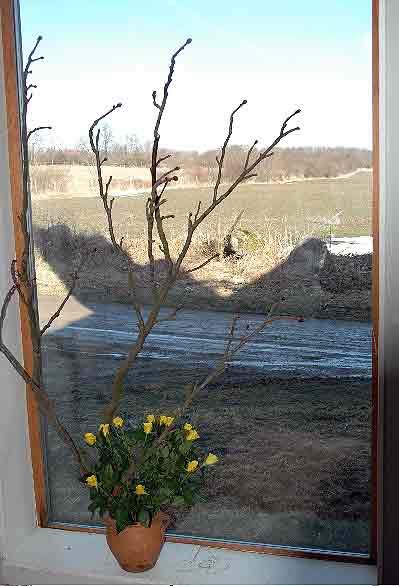 19
April 2005
19
April 2005
| SASNET News | |
| Cultural activities | New and updated information to the web site |
SASNET News:
• Tsunami catastrophe seminar
covered by media
In collaboration with Lund University’s Centre for East and South-East
Asian Studies (ACE), and AGESI (a Lund University network dealing with
global equity and sustainability issues) SASNET organised a public seminar
on ”Beyond Control – Risk and Learning after the Tsunami”
on Monday 11 April 2005, 13.00–21.00. The seminar was inaugurated
by the Vice-Chancellor of Lund University, Prof. Göran Bexell, and
was followed by afternoon lectures focusing on different aspects of risk
and disaster management.
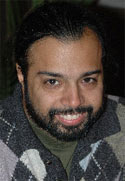 Among the
lecturers were Dr. Simron Jit Singh (photo to the left) from
the University of Vienna (who defended his dissertation on trade relations
in the Nicobar Islands, at Lund University in December 2003), and Dr Camilla
Orjuela, Dept. of Peace and Development Research, Göteborg University.
The seminar rounded up with a panel discussion with researchers, a student
and a journalist with experiences of the tsunami catastrophe, in an evening
session. Prof. Staffan Lindberg, SASNET, was the moderator. Venue: Edens
hörsal, Paradisgatan 5, Lund. More information
with full programme (only in Swedish).
Among the
lecturers were Dr. Simron Jit Singh (photo to the left) from
the University of Vienna (who defended his dissertation on trade relations
in the Nicobar Islands, at Lund University in December 2003), and Dr Camilla
Orjuela, Dept. of Peace and Development Research, Göteborg University.
The seminar rounded up with a panel discussion with researchers, a student
and a journalist with experiences of the tsunami catastrophe, in an evening
session. Prof. Staffan Lindberg, SASNET, was the moderator. Venue: Edens
hörsal, Paradisgatan 5, Lund. More information
with full programme (only in Swedish).
The journalist Stig Larsén wrote an article on the seminar in Sydsvenskan,
12 april 2005. Read the article, called ”Tsunamihjälp
får skarp kritik” (as a pdf-file). Sören Sommelius,
journalist and a participant in the seminar himself, also wrote an article,
in Helsingborgs Dagblad 13 April 2005. Read
the article, called ”Hur länge varar vårt intresse
för offren?”
• Minutes from SASNET’s
February 2005 board meeting
The SASNET Board met on Tuesday 15 February 2005, discussed
the ongoing self-evaluation, approved of eight new planning grants, and
decided about the budget for 2005. Besides praising the Internet gateway
the board strongly emphasised the priority SASNET should set to reserve
half of its budget for distribution of planning grants. The planned contact
journey to South Asia should be accommodated within a revised budget.
Bangladesh was suggested as one of the countries to be visited. Read
the minutes of the meeting.
• External experts to evaluate
SASNET in May 2005
SASNET has now completed its self-evaluation. The root node
staff, assisted by the board, has documented the networking and other
activities that SASNET has carried out since the start in January 2001.
It includes a follow-up study of the 56 planning grants distributed so
far – see the planning grants follow-up
report. This self-evaluation will now be followed by an external expert
evaluation in May 2005, when a team of evaluators will visit the SASNET
root node at Lund; Sida/SAREC and the Foreign Ministry in Stockholm, and
whichever SASNET partners they would like to meet with (the universities
of Uppsala, Karlstad, Göteborg, etc.). The evaluation group consists
of Prof. Ghanshyam Shah, Political Scientist from Ahmedabad, India; Prof.
Carla Risseeuw, Dept. of Anthropology and Development Sociology, University
of Leiden, The Netherlands; and Mr. Lennart Wohlgemut, Director of the
Nordic Africa Institute in Uppsala (team leader). A joint consultation
between SASNET personnel, external experts, Lund University and Sida SAREC
should then take place in June 2005, before a final report will be submitted
to SASNET, Sida/SAREC and Lund University. The report will be the basis
for SASNET’s application for renewed funding from Sida/SAREC and
Lund University for the period 2006–2008.
• Geshe Pema Dorje holds
SASNET lecture at Lund University
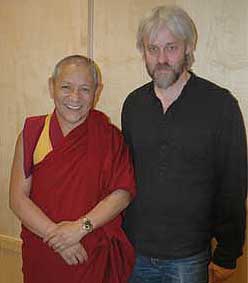 Geshe
Pema Dorje, Director of Sarah College for Higher Tibetan Studies in Dharamsala,
India, holds a SASNET lecture on ”Tibetan Education in Exile”
at Lund University on Tuesday 10 May 2005, 10.15–12.00. Dorje who
is a Buddhist monk will lecture on the organization and development of
educational institutions in the Tibetan refugee community in India and
Nepal. With a Geshe degree from the Tibetan monastic educational system,
Pema Dorje has been Principal of Tibetan Children’s Village School
as well as School of Buddhist Dialectics in Dharamsala. He has been a
driving force in the establishment of schools for teacher training and
higher education in the refugee community, travelling extensively and
co-operating with schools and universities all over the world. In Sweden
he has a long-standing relationship with Karlstad University. Venue: Conference
Room, Centre for East and South-East Asian Studies, Lund University, Alfa
1, Scheelevägen 15 D, first floor.
Geshe
Pema Dorje, Director of Sarah College for Higher Tibetan Studies in Dharamsala,
India, holds a SASNET lecture on ”Tibetan Education in Exile”
at Lund University on Tuesday 10 May 2005, 10.15–12.00. Dorje who
is a Buddhist monk will lecture on the organization and development of
educational institutions in the Tibetan refugee community in India and
Nepal. With a Geshe degree from the Tibetan monastic educational system,
Pema Dorje has been Principal of Tibetan Children’s Village School
as well as School of Buddhist Dialectics in Dharamsala. He has been a
driving force in the establishment of schools for teacher training and
higher education in the refugee community, travelling extensively and
co-operating with schools and universities all over the world. In Sweden
he has a long-standing relationship with Karlstad University. Venue: Conference
Room, Centre for East and South-East Asian Studies, Lund University, Alfa
1, Scheelevägen 15 D, first floor.
• SASNET lecture with Professor
Venkatesh B. Athreya
Professor Venkatesh B. Athreya, Economics Department at Bharathidasan
University, Tiruchirapalli, India, holds a SASNET lecture at Lund University,
the following day, on Wednesday 11 May 2005, 13.15–15.00. Athreya,
who is specialised in the political economy of development, agricultural
and social development, will lecture on ”Indian Development
under the Neoliberal Reforms, 1991-2005”. Among his most well-known
publications are ”Literacy and Empowerment” (with Sheela Rani
Chunk, Sage Publications, 1996) and ”Barriers Broken” (with
G. Djurfeldt and S. Lindberg, Sage Publications, 1990). Currently he is
co-operating with the sociologists Göran Djurfeldt and Staffan Lindberg
at Lund University in a restudy of 300 agricultural households in Tiruchirapalli
District, Tamil Nadu, which originally were interviewed in 1979/80. Venue:
Conference Room 1, Department of Sociology, Paradisgatan 5, Lund. More
information (as a pdf-file)
• Contemporary Dramas of
South Asia theme for NASA conference in Aarhus
 After
a gap of four years the Nordic Association for South Asian Studies, NASA,
arranges a conference 3–5 June 2005 in Aarhus, Denmark.
The theme for the conference will be ”Contemporary Dramas
of South Asia: Economic, Social, Political and Cultural Changes/Upheavals”,
and it is organised by the University of Aarhus. Keynote speakers are
Dr. Christophe Jaffrelot, director of the Centre d’Etudes et Recherches
Internationales (CERI), Paris; Professor Zoya Hasan, Centre for Political
Studies, Jawarharlal Nehru University, New Delhi; Professor Martin Sökefeld,
Dept. of Anthropology, Hamburg University; and Professor Isabelle Clark-Deces,
Department of Anthropology, Princeton University. SASNET is partly involved
in the conference’s workshop panel no 7 on ”Health, Globalization
and Marginalization in South Asia", by funding a couple of participants
from South Asia. More information
on the NASA conference in Aarhus.
After
a gap of four years the Nordic Association for South Asian Studies, NASA,
arranges a conference 3–5 June 2005 in Aarhus, Denmark.
The theme for the conference will be ”Contemporary Dramas
of South Asia: Economic, Social, Political and Cultural Changes/Upheavals”,
and it is organised by the University of Aarhus. Keynote speakers are
Dr. Christophe Jaffrelot, director of the Centre d’Etudes et Recherches
Internationales (CERI), Paris; Professor Zoya Hasan, Centre for Political
Studies, Jawarharlal Nehru University, New Delhi; Professor Martin Sökefeld,
Dept. of Anthropology, Hamburg University; and Professor Isabelle Clark-Deces,
Department of Anthropology, Princeton University. SASNET is partly involved
in the conference’s workshop panel no 7 on ”Health, Globalization
and Marginalization in South Asia", by funding a couple of participants
from South Asia. More information
on the NASA conference in Aarhus.
• Applications for the next round
of SASNET planning grants
are now invited. Closing date for applications is 15 June, 2005. More
information.
• SASNET Work Reports available
on the Internet
All Administrative reports regarding SASNET’s work from the first
planning process in 1999 till 2004 are available at SASNET’s web
site (as pdf-files). The latest report to be added was the Administrative
report no. 5, for the period 1 January 2004– 31 december 2004. Go
for the SASNET Work Reports.
• Beppe Karlsson appointed
new Director for Nordic Centre in India
The
Nordic Centre in India (NCI) university consortium has decided to appoint
Dr. Bengt G. (Beppe) Karlsson, Uppsala, new Director for NCI. Beppe Karlsson
(photo to the left) is at present a Research Fellow at the Department
of Cultural Anthropology and Ethnology, Uppsala University. He will
take over charge from the current Director Arild Engelsen Ruud on 1 May
2005. With this, the Nordic Centre in India will move, from Oslo to Uppsala.
Another significant change is that the director's position is much enhanced
and is now a half time position. The position will initially be limited
to a three-year period. More information
on the Nordic Centre in India (NCI).
• Swedish government adopts
new land strategy plan for development cooperation with India
On Thursday 31 March 2005 the Swedish government adopted a new
land strategy plan for development cooperation with India. The strategy
plan deals with the period 2005–2009, and sets the overall goal
of development co-operation with India to be helping create conditions
that will enable poor people to improve their situation. This should be
realised through the promotion of • respect for democracy and human
rights, • poverty-oriented environmental protection, and •
processes of pro-poor innovative research and development (in selected
areas such as poverty related programmes within Biotechnology, ICT, environment,
and health issues including hiv/aids).
 •
Eight Erasmus Mundus programmes at Swedish universities
•
Eight Erasmus Mundus programmes at Swedish universities
Swedish universities are involved in eight out of the 36 Erasmus
Mundus programmes selected by the European Commission (EC) so far. The
Erasmus Mundus programmes, providing scholarships for graduate students
from third countries to study in Europe, has a budget for 230 Million
Euros for the period up to 2008. In 2004 the EC selected the first 19
Erasmus Mundus masters courses, involving 82 European universities, to
start at the beginning of the academic year 2004-2005, and in February
2005 the EC selected a further 17 Erasmus Mundus master’s courses,
involving 69 European universities new to the scheme for courses will
start at the beginning of the next academic year (2005-2006). More
information on the Erasmus Mundus programmes available at Swedish universities.
• 900 scholarships offered to Indian
graduate students at European universities
The European Commission and the Government of India has
signed an agreement through which 900 scholarships will be offered for
Indian graduate students to study at Europe's finest
universities. The EC will provide Euros 33 Million to finance the scholarship
programme, that is part of the Erasmus Mundus programme, providing scholarships
for graduate students from third countries to study in Europe. Graduate
students can apply for a scholarship directly to the European Erasmus
Mundus Degree which interests them, a number of which includes Swedish
universities, see above. More
information.
• The 2005 Stockholm Water Prize to
be given to CSE in New Delhi
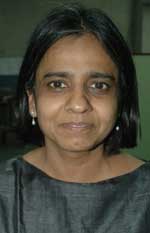 The
Centre for Science and Environment
(CSE) based in New Delhi, India, led by Ms. Sunita Narain, will receive
the 2005 Stockholm Water Prize. The award has been given by the Stockholm
International Water Institute (SIWI) to CSE for its efforts to build a
new paradigm of water management, which uses the traditional wisdom of
rainwater harvesting and advocates the role of communities in managing
their local water systems. Sunita Narain herself (photo to the left)
is a dynamic advocate for water, environment, human rights, democracy
and health, and has previously served as a member of the board for the
Stockholm Environment Institute (SEI). CSE
will receive the $150,000 Prize from HM King Carl XVI Gustaf of Sweden
during the Stockholm Water Week in August. More
information.
The
Centre for Science and Environment
(CSE) based in New Delhi, India, led by Ms. Sunita Narain, will receive
the 2005 Stockholm Water Prize. The award has been given by the Stockholm
International Water Institute (SIWI) to CSE for its efforts to build a
new paradigm of water management, which uses the traditional wisdom of
rainwater harvesting and advocates the role of communities in managing
their local water systems. Sunita Narain herself (photo to the left)
is a dynamic advocate for water, environment, human rights, democracy
and health, and has previously served as a member of the board for the
Stockholm Environment Institute (SEI). CSE
will receive the $150,000 Prize from HM King Carl XVI Gustaf of Sweden
during the Stockholm Water Week in August. More
information.
• SARTrain
part of Asian Century Research School of Nordic countries
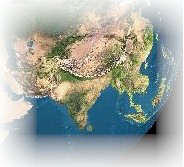 A
joint Nordic research school on Asia is currently being established by
the Nordic Institute for Asian Studies in Copenhagen (NIAS) in collaboration
with Nordic partners. The so called ”Asian Century Research School”
is envisioned as a “network research school”, based on the
exchange of teachers, students, and other research resources at a Nordic
level to facilitate a much-needed “critical mass”, and ensuring
a better education and training of future scholars in the Asian fields.
The planning was initiated at a meeting in September 2004 by a Nordic
working group, consisting of representatives from universities in Finland,
Sweden, Norway and Denmark (including SASNET’s Director, Prof. Staffan
Lindberg).
A
joint Nordic research school on Asia is currently being established by
the Nordic Institute for Asian Studies in Copenhagen (NIAS) in collaboration
with Nordic partners. The so called ”Asian Century Research School”
is envisioned as a “network research school”, based on the
exchange of teachers, students, and other research resources at a Nordic
level to facilitate a much-needed “critical mass”, and ensuring
a better education and training of future scholars in the Asian fields.
The planning was initiated at a meeting in September 2004 by a Nordic
working group, consisting of representatives from universities in Finland,
Sweden, Norway and Denmark (including SASNET’s Director, Prof. Staffan
Lindberg).
Within the framework of the Asian Century Research School the intention
is to facilitate creation of a number of research clusters, accommodating
the different needs and interests in research and research training of
Nordic scholars and students. The Gendering
Asia Network and the South Asia Research Training (SARTrain) are examples
of research clusters that are in the process of being organised. The Swedish
School for Advanced Asia-Pacific Studies (SSAAPS) has offered to fund
the first meetings of another three research clusters in Sweden, concerning
“Economic Studies in Asia” (Thommy Svensson, SSAAPS),
“Technological Innovation in Asia” (Anders Törnvall,
Linköping University) and “Democratisation and Political
Change in Asia” (Hans Blomkvist, Uppsala University). Jan Kanne
Petersen works as the project coordinator of the research school, and
as such he will work closely together with the working group to organise
research clusters, and prepare applications to attract funding for training
activities. More information
on the Asian Century Research School.
• The Lancet’s Neonatal Survival
series free of charge at the Internet
![]() The Lancet, the world's leading independent general medical journal
(1.1 million registered users), has introduced a new series called Neonatal
Survival, focusing on the issue of child survival. The aim behind Neonatal
Survival is to erase the excuse of ignorance for public and political
inaction once and for all. The series is the product of a partnership
between scientists, health workers, and journal editors. The Lancet has
decided to support this important public health campaign by making this
special issue available through the Internet at no cost. Professor Zulfiqar
Bhutta, Aga Khan University, Karachi, Pakistan, is one of the main contributors
to Neonatal Survival. Go
for the digital edition of the 56 page special issue of the Lancet.
The Lancet, the world's leading independent general medical journal
(1.1 million registered users), has introduced a new series called Neonatal
Survival, focusing on the issue of child survival. The aim behind Neonatal
Survival is to erase the excuse of ignorance for public and political
inaction once and for all. The series is the product of a partnership
between scientists, health workers, and journal editors. The Lancet has
decided to support this important public health campaign by making this
special issue available through the Internet at no cost. Professor Zulfiqar
Bhutta, Aga Khan University, Karachi, Pakistan, is one of the main contributors
to Neonatal Survival. Go
for the digital edition of the 56 page special issue of the Lancet.
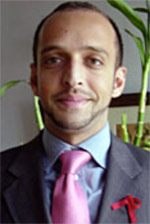 •
Digital Library cornerstone of new Pakistani university strategy
•
Digital Library cornerstone of new Pakistani university strategy
The Higher Education Commission of Pakistan (HEC) has entered
into a collaborative programme with the National Academy of Sciences (USA)
to enhance the content of the Digital Library resources. The project involves
the negotiation and acquisition of scientific literature and academic
(journal) databases from selected American Scientific Societies to meet
the specific information requirements of the research sector in Universities
in Pakistan. The project is part of the Digital
Library Program launched by Pakistan in January 2004, and is
considered to beone of the cornerstones of a strategy to capitalize on
the potential of ICT to turn the universities of Pakistan into world-class
seats of learning. It is a parallell project to the collaboration agreements
on research training that Pakistan recently signed with Sweden and other
countries (more information on this agreement).
LiveWire, a journal published by the American Chemical Society,
in March 2005 made an interview with Kamran Naim (photo to the right),
coordinator for Pakistan’s Digital Library project. Read
the article (as a pdf-file).
• Critique by Professor Pervez Hoodbhoy on
the educational situation in Pakistan
Pervez Hoodbhoy, professor of physics at Quaid-i-Azam University,
Islamabad, is one of the leading intellectual front figures in Pakistan.
In January 2005 he published two articles in the newspaper Dawn that
were higly critical of the situation for higher education in his country.
In the articles, called ”Reforming our Universities”
he writes that Pakistan ”has almost a hundred universities now,
but not one of them is world class”. Go
for the article. In a second article, called ”Controversy
on HEC measures: Reforming our universities” Hoodbhoy critisises
the way the Higher Education Commission, HEC, tries to handle the problems.
Go for the article.
• Observations by Professor Hoodbhoy
on science and society in India
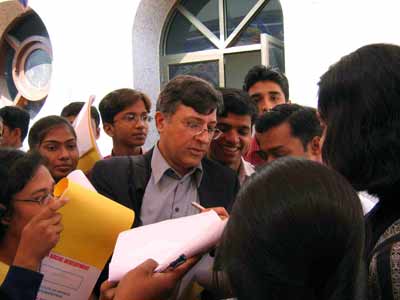 In
2003 Professor Pervez Hoodbhoy received the award of UNESCO's Kalinga
Prize for the popularization of science. One part of the Prize included
a four-week lecture tour to India. In January-February 2005 he finally
took off and toured India, visiting Delhi, Pune, Mumbai, Bangalore, Chennai,
Hyderabad, Bhubaneshwar, Cuttack and Kolkata before returning back to
Islamabad. See photo from Bhubaneshwar The tour resulted in a lengthy
article, called ”India Through Pakistani Eyes. Observations on science
and society in India”, that was published in the Sunday Magazine
of Dawn on 19 February 2005. Go
for the article.
In
2003 Professor Pervez Hoodbhoy received the award of UNESCO's Kalinga
Prize for the popularization of science. One part of the Prize included
a four-week lecture tour to India. In January-February 2005 he finally
took off and toured India, visiting Delhi, Pune, Mumbai, Bangalore, Chennai,
Hyderabad, Bhubaneshwar, Cuttack and Kolkata before returning back to
Islamabad. See photo from Bhubaneshwar The tour resulted in a lengthy
article, called ”India Through Pakistani Eyes. Observations on science
and society in India”, that was published in the Sunday Magazine
of Dawn on 19 February 2005. Go
for the article.
• Report from Lund workshop
on Sikh and Punjab Studies
On March 19 2005 a one-day workshop on Sikh and Punjab Studies
was arranged at the Centre for Theology and Religious Studies at Lund
University. The workshop was attended by about 60 people, including students
and teachers from various universities in Scandinavia, as well as members
of the Sikh communities in Sweden and Denmark. The key speakers were internationally
renowned experts from Germany, Sweden, UK and USA, who are working within
the interdisciplinary field of Sikh and Punjab Studies. Read
Kristina Myrvold’s conference report.
• Indic Studies Network
based at CSDS in New Delhi
The Indic Studies Network (IsNew) was established
at the Conference on Religions in the Indic Civilisation, held in New
Delhi in December 2003. This nascent organization aims to bring together
individual scholars and academicians from the fields of religious and
cultural studies of the region, providing linkages and a forum for vibrant
intellectual study. IsNew is based at the Centre for the Study of Developing
Societies in New Delhi, India. More
information.
• Fellowships available
at the Library of Congress John W. Kluge Center
Fellowships are available at the Library of Congress John W.
Kluge Center. The Library of Congress in Washington D.C, USA, invites
qualified scholars to conduct research in the Center using the Library
of Congress collections and resources for a period of up to eleven months.
The Kluge Center especially encourages humanistic and social science research
that makes use of the Library's large and varied collections. More
information.
• Five out of 30 Asia-Link
projecs include South Asian partners
EU’s Asia-Link programme fosters regional and multilateral
networking between higher education institutions in Europe, and those
in developing countries in Asia. Asia-Link does this in three ways: (a)
It provides funding for partnerships between European and Asian higher
education institutions (HEIs) to carry out specific projects, aimed at
developing human resources and new curricula, and at improving administration
within institutions. (b) It also provides support for capacity-building
actions to improve knowledge and skills in project design and management
among higher education institution staff. (c) It carries out a range of
programme support activities, including the development of information
and studies, promotional activities, consultation of stakeholders, networking
of benefi ciaries and the dissemination of results. The first phase of
the Programme was launched in 2002. As of February 2005, the Asia-Link
Programme had granted over EUR 36.6 million in co-funding to support 126
projects, which together involved 550 higher education institutions. The
EuropeAid Co-operation Office has published a fourth Call for Proposals
for the Asia-Link Programme, with two deadlines in 2005: 10 February 2005
and 19 May 2005. Guidelines for applicants and application form available
on the Asia-Link
Programme web page.
59 project proposals arrived at EuropeAid in time for the
10 February 2005 deadline, the first under the 2005 Call for Proposals.
These will now be checked for administrative compliance and eligibility
before technical evaluation during March.
At the same time 30 projects have been recommended for funding under the
second deadline of the Third Call for Proposals
(September 2004 deadline). Out of these 30 projecs five include South
Asian partners. More information on the latest
South Asia related projects recommended for funding.
• Nordic MA students and PhD candidates
offered NIAS SUPRA scholarships
The Nordic Institute for Asian Studies (NIAS) offers scholarships
for visiting Nordic MA students and PhD candidates to its research centre
and library in Copenhagen, through the so called NIAS SUPRA programme
(Support Programme for Asian Studies). Students affiliated with institutions
that are members of the Nordic NIAS Council (see www.nias.ku.dk)
are offered full scholarships that cover travel expenses, accommodation
and full board at the ”Nordisk
Kollegium”, whereas students from non-members of Nordic NIAS
Council will have to pay for accommodation and transportation themselves.
For students from Lund University there is also an alternative, namely
Öresund Scholarships. In this case NIAS reimburses daily commuting
costs to/from Copenhagen. NIAS SUPRA received 47 students in 2004. Application
deadlines for SUPRA scholarships are three times a year. In 2005: 4
April, 5 September and 28 November. More
information with application forms.
• Masters level course
on Histories of Colonial Experience at Uppsala University
The Department of History at Uppsala University
organises a 5 credits Masters level course on ”Histories of Colonial
Experience” during the period April–June 2005. The course
provides an overview of debates, interpretations and perspectives in colonial
history in contemporary debates. It focuses mainly on the inner socio-economic
and political dynamics of regions under late colonial rule within the
British Empire, i.e. 1750-1950. More
information.
• Masters level courses
in the field of Environmental history and political ecology at Uppsala
University
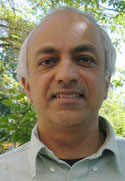 The Department of Cultural Anthropology and Ethnology
offers two 5 credits Masters level courses in the field of Environmental
history and political ecology in the Fall 2005. Courses drawing much
from south Asian experiences. The first course is titled ”Postcolonial
Natures”, and will run during September-October. Teacher: K. Sivaramakrishnan,
Professor of Anthropology and International Studies, University of
Washington, Seattle, USA (photo to the left). Preliminary
arrangements have been made to also include Arun Bandopadhyay, Nurul
Hasan professor of history, Calcutta University, and Dr. Suparna Gooptu,
reader, Department of History, Calcutta University, as teachers in
the course. The second course is titled ”Political Ecology”,
and will run from November to January 2006.
The Department of Cultural Anthropology and Ethnology
offers two 5 credits Masters level courses in the field of Environmental
history and political ecology in the Fall 2005. Courses drawing much
from south Asian experiences. The first course is titled ”Postcolonial
Natures”, and will run during September-October. Teacher: K. Sivaramakrishnan,
Professor of Anthropology and International Studies, University of
Washington, Seattle, USA (photo to the left). Preliminary
arrangements have been made to also include Arun Bandopadhyay, Nurul
Hasan professor of history, Calcutta University, and Dr. Suparna Gooptu,
reader, Department of History, Calcutta University, as teachers in
the course. The second course is titled ”Political Ecology”,
and will run from November to January 2006.
• Master’s Programme
in Development Studies at Uppsala University
 The
Department of Government at Uppsala University introduced a 60 ECTS-credits
(40 Swedish points) Master’s Programme in Development Studies in
September 2003. The programme, partly focusing on South Asia, has been
designed to attract students with a special interest in development issues,
and might be useful for personnel working in the foreign services, aid
organisations, the UN, and non-governmental organisations. The teachers
are Shirin Ahlbäck-Öberg, Mattias Burell, Magdalena Inkinen
and Sten Widmalm. A new programme starts in September 2005. More
information on the programme.
The
Department of Government at Uppsala University introduced a 60 ECTS-credits
(40 Swedish points) Master’s Programme in Development Studies in
September 2003. The programme, partly focusing on South Asia, has been
designed to attract students with a special interest in development issues,
and might be useful for personnel working in the foreign services, aid
organisations, the UN, and non-governmental organisations. The teachers
are Shirin Ahlbäck-Öberg, Mattias Burell, Magdalena Inkinen
and Sten Widmalm. A new programme starts in September 2005. More
information on the programme.
• Independent course on
Global Health at Karolinska Institutet Medical University
The Department of Nursing, The Division of International Health, IHCAR,
and the Department of Public Health Sciences, every semester arranges
a 5 credits independent course on Global Health. The course is open to
students at Karolinska Institutet in the Medical programme, Midwifery
programme, Nursing programme, Dental programme, Biomedical laboratory
programme, Physiotherapy programme, Occupational therapy programme, and
the Biomedical programme. The students can choose to do the field work
at Karolinska’s two collaboration partner institutions in South
Asia: The Aga Khan University, Karachi, Pakistan; and Trivandrum Medical
College, Thiruvananthapuram, India. More
information on the Global Health course.
• KI organises courses
in Global Medicine for Junior Hospital Doctors in Madhya Pradesh
The Center
for Public Health, CeFAM (a collaboration between Karolinska Institutet
and the county council of Stockholm) organises courses in Global Medicine
for Junior Hospital Doctors (ST-läkare). The Sida funded courses
deal with diseases like malaria, TB and AIDS, and take place either
in Ethiopia or in India (four months at R.D.Gardi Medical College, in
Ujjain, Madhya Pradesh. More
information.
• Engineering students
run Project India 2005 at KTH
Project India 2005 is the fourth international engineering project. It
is a one-year project-based course initiated and run by KTH students.
The aim of the project is to analyse the potential of the Indian market
and to investigate its affect on Swedish companies. The results will be
presented to the companies involved, as well as to students and staff
of KTH in the form of seminars and a published report.
• Time to apply for World course on
Justice, Peace and Environment at Ljungskile Folkhögskola
A new ”World course on Justice, Peace and
Environment is arranged at Ljungskile Folk High school during August–December
2005, including a three weeks stay at the village folk high school Jagriti
Vihara in Ranchi, Jharkhand. Last date for applications: 3 May 2005. More
information.
• Time to apply
for Ecology and Global Solidarity course on Nordens Folkhögskola
Biskops-Arnö
A 36 weeks course on Ecology and Global Solidarity, is arranged every
year. The next course starts in August 2005, and includes a two months
stay in India in January–February 2006, where the students will
study local projects working against the globalisation and for an ecologically
and socially sustainable society. Last date for applications: 24 April
2005. More information.
• Stockholm follow-up
conference on the tsunami disaster
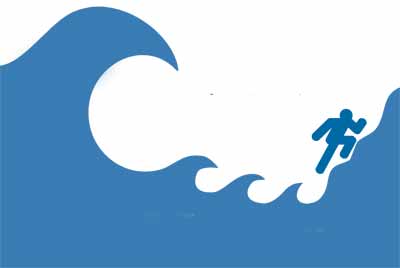 CORDIO
and Swedish Water House invite for a seminar on ”Short-term
handling of disaster relief vs. long-term sustainable development
in South-East Asia”, on Wednesday 20 April 2005, 13.30-16.15.
It is a follow-up seminar to the conference ”What
Can We Do? – Mobilizing technical capacity for South-East
Asia” arranged by the Royal Institute of Technology (KTH),
Swedish Water House and Engineers Without Borders Stockholm (INUG)
on 4 February 2005. Among the lecturers are Professor Olof Lindén,
World Maritime University, Malmö, who will talk on ”Coastal
fishing – heading for collapse”; Fiona Miller,
Stockholm Environment Institute, on ”Freshwater for sustainable
livelihoods: how to reduce vulnerability in the coastal zone?”;
and Patrik Rönnbäck, Stockholm University, on ”Mangrove
forests and ecosystem services – could the effects of the
Tsunami have been prevented, and what are the prospects for the
future”. Venue: Piperska Muren (Scheelegatan 14, Stockholm.
More
information.
CORDIO
and Swedish Water House invite for a seminar on ”Short-term
handling of disaster relief vs. long-term sustainable development
in South-East Asia”, on Wednesday 20 April 2005, 13.30-16.15.
It is a follow-up seminar to the conference ”What
Can We Do? – Mobilizing technical capacity for South-East
Asia” arranged by the Royal Institute of Technology (KTH),
Swedish Water House and Engineers Without Borders Stockholm (INUG)
on 4 February 2005. Among the lecturers are Professor Olof Lindén,
World Maritime University, Malmö, who will talk on ”Coastal
fishing – heading for collapse”; Fiona Miller,
Stockholm Environment Institute, on ”Freshwater for sustainable
livelihoods: how to reduce vulnerability in the coastal zone?”;
and Patrik Rönnbäck, Stockholm University, on ”Mangrove
forests and ecosystem services – could the effects of the
Tsunami have been prevented, and what are the prospects for the
future”. Venue: Piperska Muren (Scheelegatan 14, Stockholm.
More
information.
• Oslo lecture on
Georg Morgenstierne’s Afghanistan collection
The Asian network at Oslo University (Asianettverket)
introduces a seminar series with public lectures on Afghanistan
during the Spring 2005. The first seminar is held on Thursday 21
April, 14.15–16.00, in collaboraition with Oslo University’s
Centre for Development and the Environment (SUM). Wlodek Witek from
the National Library of Norway lectures on ”What an explorer
saw and heard – on the Morgenstierne collection”.
It deals with the vast material on Afghanistan collected during
the period 1923–1971 by Georg Morgenstierne, Professor of
Indo-Iranian languages at the University of Oslo (photo to the
right). His archive, now kept at the National Library of Norway,
consists of unique photographs, sound recordings from now almost
extinct languages, and silent movies (e g from pre-Islamic ritual
dances in the Kalash valleys). Morgenstierne’s pioneer contribution
in Afghanistan today raises international interest, and a multimedia
database consisting of original sources has recently been published
on the Internet (go
for the Georg Morgenstierne database). Venue for the lecture:
Store Seminarrom, Senter for Utvikling og Miljø (SUM), Sognsevein
68, Oslo.
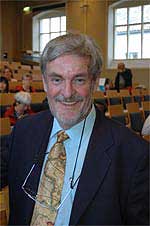 •
Oslo lecture on the ancient Gandhara culture of Afghanistan/Pakistan
•
Oslo lecture on the ancient Gandhara culture of Afghanistan/Pakistan
Dr. Jens Braavig from the Institute for Cultural Studies
and Oriental Languages (IKOS) at the University of Oslo holds the
second lecture in the seminar series on Afghanistan, on Thursday
28 April, 14.15–16.00. Braavig will lecture on ”When
Afghanistan was Gandhara”. Venue: Store Seminarrom, Senter
for Utvikling og Miljø (SUM), Sognsevein 68, Oslo. More
information.
• Lasse Berg lectures
in Lund on Asian and African Globalisation in perspective
A seminar on ”Globalisation and African Development”
is held at Lund University on Monday 9 May 2005, 9.15–16.30.
The seminar includes lectures comparing the development in Africa
with the one in Asia. The writer and journalist Lasse Berg (photo
to the right), holding an honorary doctorate at Lund University,
will talk on ”Asian and African Globalisation in Perspective”,
and Associate Professor Hans Holmén from the Tema Institute,
Department of Geography, Linköping University will talk on
”The African Food Crisis: Lessons from the Asian Green
Revolution”. Venue: Palaestra, Paradisgatan, Lund. More
information (as a pdf-file)
• Sri Lanka slide
show by Professor Bo Lambert in Stockholm
A visual presentation
of Sri Lanka by Bo Lambert, Professor of Environmental Medicine
and Genetic Toxicology at the Karolinska Institute Medical University,
Stockholm, will be held at the Museum of Far Eastern Antiquities
in Stockholm on Tuesday 10 May 2005, 18.00–19.30. Bo Lambert
is also a devoted amateur photographer and frequent Sri Lanka visitor
and will present a selection of slides from his journeys to Sri
Lanka during the past three years. Venue: Hörsalen, Museum
of Far Eastern Antiquities, Skeppsholmen. See
also a press cutting presenting the photo exhibition Prof Lambert
held in Colombo in March 2005 (as a pdf-file).
• CPAS Seminar on
China-India Economic Engagement
The Center for Pacific Asia Studies (CPAS) at Stockholm University
invites for a seminar on 'China-India Economic Engagement: Building
Mutual Confidence' on Wednesday, 11 May 2005, 14.00–16.00.
Dr. Swaran Singh, Associate Professor at the School of International
Studies, Jawaharlal Nehru University, New Delhi, will lecture on
how China and India have come to be recognized as the two largest
as also the fastest growing economies of the 21st century. Thanks,
however, to their colonial and cold war legacies, this economic
boom had, for long, remained mutually exclusive exercise. It is
only rather recent that their political initiatives at confidence
building have begun to develop areas of mutual engagement which
remains premised on their new mantra of mutual accommodation and
mutual benefit. Dr. Singh has formerly been a fellow at Beijing
University, Shanghai Institute of International Studies, Center
for Asian Studies (Hong Kong University) and Institute for Defence
Studies and Analysis (New Delhi). He is author of China-India Economic
Engagement: Building Mutual Confidence (2005); China-South Asia:
Issues, Equations, Policies (2003) and China’s Changing National
Security Doctrines (1999) and Limited War (1995). Venue: CPAS, Kräftriket
4B, Stockholm.
• Uppsala Seminar
on the Indian History School Book Controversy
A seminar on the ”Indian History Wars” is held at Uppsala
University on Wednesday 11 May 2005, 14.00–16.00. Two lectures
will be given on the recent controversy on historical research in
India, where the history discipline and the writing of history have
been ideologically politicised. The (former) Hindu nationalist government
actively replaced academic historians in national research boards
and revised textbooks in several states to fit the Hindu nationalist
ideology. Specifically ancient history and theories of the ”Aryans”
have come onto revisionist agendas. William L. Smith, Professor
of Uppsala University (the new professor of Indology at the Section
for Asian and African Languages and Cultures, Uppsala University,
lectures on ”The Aryan Invasion theory and Its Opponents”,
and Professor Kunal Chakrabarti from Jawaharlal Nehru University,
New Delhi, India, lectures on ”The History School Book Controversy”.
Venue: Humanistiskt Centrum, room 6 - 0031, Engelska parken (Thunbergsvägen
3H), Uppsala. For more information, contact Beppe
Karlsson.
• Afghanistan lectures
by Lars Martin Fosse and Ruth Schmidt in Oslo
The Asian network at Oslo University (Asianettverket) continues
with its series of public lectures on Afghanistan. In the third
lecture, on Thursday 12 May 2005, 14.15–16.00, Lars Martin
Fosse, University of Oslo, will lecture on ”Soviet operational
tactics and Afghani resistance”, and Ruth Schmidt, also
University of Oslo, will talk on ”Four paradigms of Jihad:
Afghanistan between 1979 and 1987”. Venue for the lecture:
Store Seminarrom, Senter for Utvikling og Miljø (SUM), Sognsevein
68, Oslo. More
information (as a pdf-file).
• Alumni conference at Lund University
on sustainable development
Lund University Centre for Sustainability Studies (LUCSUS) organises
a so-called Lund Sustainability Forum 2005, 20–21 April 2005. The
conference is organised as a reunion for alumnis from LUMES (Masters Programme
in Environmental Science) run at Lund University since 1997. Some 300
students from some 70 countries are then reassembling in Lund to share
their experiences. The conference will be open to public and consists
of key note addresses, panel discussions and a number of parallel sessions
related to Third World development. Ola Rosling will lecture on ”Global
Health – what's at stake and what's our response?”, Lennart
Olsson on ”What is the Concensus in Climate Change in Science,
Politics and Implementation?” and Annica Young Kronsell on
”Gender in the Development Discourse”. Venue: Kårhuset,
John Ericssons väg 3, Lund. More information on Lund Sustainability
Forum 2005.
• Lillehammer conference on Indo-Scandinavian
collaboration within higher education
The International Council for Open and Distance Education (ICDE)/Network
Scandinavia organises a conference in Lillehammer 25–26 April 2005.
The conference is titled ”From the local to the global – Collaboration
within higher education between India and the Scandinavian Countries”.
A few selected institutions from both India and the Scandinavian
countries have been invited to discuss topics such as student exchange,
study program development and research, and development collaboration
within the use of ICT and New Media in education. ICDE is approved and
authorized by the United Nations (UNESCO) to serve as the Global Institutional
Membership Organization in Online, Flexible and Blended Learning, including
e-learning and distance education.
• Dubrovnik course on etnography, aid
and development
Postgraduate students from any discipline who are currently
engaged in work on any aspect of aid and development, and who are committed
to utilising ethnographic methods and approaches, are invited to a five-days
course at he Inter-University Centre Dubrovnik, Croatia, 25–29
April 2005. Aid and development practioners and researchers with an interest
in these themes are also welcome to apply for the course that is planned
by researchers from different European countries. The course lecturer
will be Steven Sampson, University of Lund, Sweden.
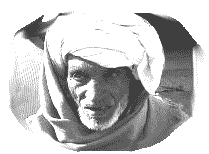 •
Alliances and boundaries in focus for Pakistan Workshop 2005
•
Alliances and boundaries in focus for Pakistan Workshop 2005
The Pakistan Workshop 2005 with the theme ”Building Alliances
and Blurring Boundaries” will be held at Rook How, in the English
Lake District 6–8 May 2005. The focus of the workshop will be
on different types of alliances and those who engage in them. The Pakistan
Workshop has been held regularly in the idyllic country setting of the
Lake District since 1986. It was formed to provide anthropologists and
other social scientist with a venue to meet and discuss ongoing research.
The Workshop has always maintained a relaxed atmosphere for exchanging
ideas and meeting people.
• Gendering Asia Conference to be held
in Kungälv
The first Gendering Asia Conference, organised by the Nordic
Research Network Gendering Asia and the Centre for Asian Studies, Göteborg
University, is held at Kungälv, north of Göteborg, 19–21
May 2005. The conference is planned to be an annual event highlighting
recent Nordic developments in research on gender in Asia. Scholars and
PhD students from any discipline working with topics related to the overall
theme of Gendering Asia are invited to take part. Even though the conference
especially addresses Nordic scholars and students or scholars based at
Nordic institutes, non-Nordic scholars interested in this conference also
are most welcome to submit an abstract. More
information.
• Amsterdam conference/workshop on Music
and the Art of Seduction
An International conference/workshop on ”Music and the
Art of Seduction” is held in Amsterdam, the Netherlands, 19–22
May 2005. The conference, hosted by the Music Department of the University
of Amsterdam, in co-operation with the Bake Society and the Amsterdam
School of Cultural Analysis (ASCA), includes a separate panel on ”Courtesans
in North India: Past and Present”, convened by Lalita du Perron,
SOAS, University of London, UK. Venue: Royal Tropical Institute (KIT),
Amsterdam. Besides paper presentations and discussion panels the workshop
will also feature a number of musical concerts.
• 2005 Annual Bank Conference
on Development Economics (ABCDE) in Amsterdam
 The
2005 Annual Bank Conference on Development Economics (ABCDE) is held 23–24
May 2005 in Amsterdam, the Netherlands. ABCDE is one of the world’s
best known series of conferences on development, first organized in Washington
DC in 1988. Each year the ABCDE brings together leading policy-makers,
academics, civil society representatives, journalists and students, fostering
dialogue and contributing new knowledge on development issues. ABCDE 2005,
organised by the World Bank in collaboration with the Ministry of Foreign
Affairs, the Minister of Development Cooperation and the Ministry of Finance
of The Netherlands, will be the first global ABCDE held in Europe. The
theme of the conference will be ”Securing Development in an
Unstable World”. Deadline for applications is April 23, 2005.
The organizers offer a limited number of Support Grants for participants
coming from and based in developing or transition countries. Researchers,
journalists, civil society representatives and students alike are invited
to apply for the grant. Venue: The Royal Tropical Institute (KIT, Mauritskade
63, Amsterdam. More
information.
The
2005 Annual Bank Conference on Development Economics (ABCDE) is held 23–24
May 2005 in Amsterdam, the Netherlands. ABCDE is one of the world’s
best known series of conferences on development, first organized in Washington
DC in 1988. Each year the ABCDE brings together leading policy-makers,
academics, civil society representatives, journalists and students, fostering
dialogue and contributing new knowledge on development issues. ABCDE 2005,
organised by the World Bank in collaboration with the Ministry of Foreign
Affairs, the Minister of Development Cooperation and the Ministry of Finance
of The Netherlands, will be the first global ABCDE held in Europe. The
theme of the conference will be ”Securing Development in an
Unstable World”. Deadline for applications is April 23, 2005.
The organizers offer a limited number of Support Grants for participants
coming from and based in developing or transition countries. Researchers,
journalists, civil society representatives and students alike are invited
to apply for the grant. Venue: The Royal Tropical Institute (KIT, Mauritskade
63, Amsterdam. More
information.
• SASNET–Fermented Foods networking
project workshop to be held in Anand
The SASNET–Fermented Foods networking project organises
a workshop highlighting the health benefits of fermented foods in Anand,
Gujarat, India, 26–27 May 2005. This is the first in a series of
three workshops planned for 2005 by the EU-funded networking project,
and it will be devoted to informing South Asian policy makers of institutions
of higher education and research, in order to encourage a dialogue to
define the role of such institutions in activating a network of information
on fermented foods. More information.
• Oslo conference on Women's Rights,
Racism and Religion
The Nordic Institute for Women’s Studies and Gender Research
at the University of Oslo arranges a conference on ”Crossroads:
Debating Women's Rights, Racism and Religion”, 31 May–1 June
2005. A principal aim of the conference is to initiate dialogue between
minority and majority feminist researchers, and be a forum for discussion
on issues like what anti-racist feminism is, and how solidarity politics
can be expressed? Other themes to be brought up during workshops include
”Gender, Citizenship and Politics” and ”Theorizing
the Diaspora in Literary and Cultural Studies”. One keynote
speaker is Uma Narayan, Professor in Philosophy at Vassar College, USA.
Her book ”Dislocating Cultures” discusses Third world
feminism, including different understandings of violence against women.
Venue: Helga Eng's house, at the University of Oslo, Blindern. More
information
• Roskilde University organises PhD
workshop on Fieldwork
IDS, International Development Studies, at Roskilde University
Centre, Denmark, holds a PhD workshop on Fieldwork, 16–17 June 2005.
The workshop is organised by PhD candidates Rikke Brogaard, Jakob Trane
Ibsen and Helene Kyed, and has Professor Christian Lund from IDS, as key
resource person. The themes for the workshop are ”Studying institutions
and politics as social fields” and ”Conflicts and
conflict ridden settings – moving in the field”. It is
open to all PhD students upon application by April 20th.
• WIDER conference on the future of
Development Economics
The World Institute for Development Economics Research of the
United Nations University (UNU-WIDER) invites for a Jubilee Conference
on 'WIDER Thinking Ahead: the Future of Development Economics', in Helsinki,
Finland, 17–18 June 2005. Leading International researchers and
policymakers will meet at the conference to mark UNU-WIDER's jubilee anniversary,
and to reflect upon where we now stand in development economics and what
the next two decades might hold. Applications to participate should be
sent before 14 February 2005. More
information.
• Poverty, equity and health research
theme for Mumbai workshop
The ninth Annual Global Forum for Health Research will be held
in Mumbai, India. 12–16 September 2005. The theme for the forum,
that usually gathers around 700 participants from a broad range of constituencies,
will be ”Poverty, equity and health research”. The
Global Forum for Health Research was established as an independent international
foundation in Switzerland in 1998. The annual Forum meeting is one of
its most prominent activities to focus attention on the neglected health
research needs of developing countries. It is widely recognized as ”the”
annual gathering on health research.
• Kathmandu conference on Solid Waste
Management
An International Conference on Sustainable Solid Waste Management
in Developing Countries, called ”For a Better Tomorrow” is
held in Kathmandu, Nepal, 8–12 January 2006 (Note: changed
date). The conference – the first one to focus on local
waste management issues in Nepal – is organized by DNet, an organization
involved in the issue in Kathmandu, on behalf of Kathmandu University
and the Swedish LAQUA group (involving the three universities of Kalmar,
Lund and Kristianstad). Some regional institutes from other South Asian
countries, as well as from Thailand and Europe will also take part. More
information.
• 19th European Conference of Modern
South Asian Studies to be held at Leiden
The 19th European Conference of Modern South Asian Studies (ECMSAS)
will be held at Leiden University, the Netherlands, 27–30 June 2006.
Panel suggestions are now invited, and should be given before 1 June 2005.
More information on the
19th ECMSAS conference.
• Other conferences connected to South Asian
studies arranged all over the World
See SASNET’s page, http://www.sasnet.lu.se/conferences.html#conf
• Georg Morgenstierne’s
Afghanistan collection available through the Internet
The National Library of Norway
has a vast material on Afghanistan collected during the period 1923–1971
by Georg Morgenstierne, Professor of Indo-Iranian languages at the University
of Oslo (photo to the right). His archive, now kept at the National
Library of Norway, consists of unique photographs, sound recordings from
now almost extinct languages, and silent movies (e g from pre-Islamic
ritual dances in the Kalash valleys). Morgenstierne’s pioneer contribution
in Afghanistan today raises international interest, and a multimedia database
consisting of original sources has recently been published on the Internet.
More
information on the Georg Morgenstierne database.
• Indian films shown at the 2005 Natfilm
Festival in Denmark
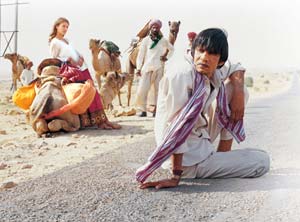 Five
Indian films were shown at the 2005 Natfilm Festival, the biggest International
film event in Denmark, where very single cinema in Copenhagen participated
in the festival. Parts of the programme was also screened in three other
cities in Denmark: Odense, Aalborg and Århus, as well as in Malmö
and Lund in neighbouring Sweden. The Indian films shown included Buddhadeb
Dasgupta’s excellent movie 'Chased By Dreams', Rituparno
Ghosh’s 'Raincoat', Ganapathy Bharatbala’s first
ever Indian road movie 'Hari Om' (photo from this film to
the left), Mani Ratnam’s crimi movie based in Kolkata 'Yuva',
and Yash Chopra’s 'Veer-Zaara'. More
information on the festival and the films (in Danish only).
Five
Indian films were shown at the 2005 Natfilm Festival, the biggest International
film event in Denmark, where very single cinema in Copenhagen participated
in the festival. Parts of the programme was also screened in three other
cities in Denmark: Odense, Aalborg and Århus, as well as in Malmö
and Lund in neighbouring Sweden. The Indian films shown included Buddhadeb
Dasgupta’s excellent movie 'Chased By Dreams', Rituparno
Ghosh’s 'Raincoat', Ganapathy Bharatbala’s first
ever Indian road movie 'Hari Om' (photo from this film to
the left), Mani Ratnam’s crimi movie based in Kolkata 'Yuva',
and Yash Chopra’s 'Veer-Zaara'. More
information on the festival and the films (in Danish only).
• Colourful dance performance and seminar
in Stockholm
A group of ten folk musicians, dancers and singers from Purulia,
in the western part of the Indian state of West Bengal, visited Sweden
in the middle of March 2005. A performance called ”Bengali
Night” featuring suggestive so-called jhumu music
and nachni dance (by Shonda Rani), was given at Södra Teatern
in Stockholm on Friday 11 March. A group of baul singers from
the same region also took part in the show. The Purulia folk artists’
tour to Sweden was initiated by Associate Professor Christina Nygren,
Dept. of Musicology and Theatre Studies, Stockholm University. She is
presently completing an extensive research project on popular forms of
theatre in Bangladesh and West Bengal. The day before the performance
in Strockholm, on Thursday 10 March 2005 she organised a seminar on ”Traditional
Bengali theatre, culture and music” with the ten artists from
Purulia. The seminar was held at Tonsalen in the Slava Theatre in Huddinge,
south of Stockholm. Read Lars Eklund’s
report from the Huddinge seminar.
New and updated items on SASNET web site
• More Swedish departments where research
on South Asia is going on:
Added to the list of research environments at Swedish universities,
presented by SASNET. The full list now includes 148 departments. Go
to the presentation page.
ƒ Institute of Conservation, Department of Environmental Science and Conservation, Göteborg University
• Several new articles recommended for reading
Look at http://www.sasnet.lu.se/recreading.html
for suggestions on interesting new articles on South Asia in International
media. New items added.
Best regards,
Staffan Lindberg Lars Eklund
SASNET/ Swedish South Asian Studies Network
SASNET is a national network for
research, education, and information about South Asia, based at Lund University.
The aim is to encourage and promote an open and dynamic networking process,
in which Swedish researchers co-operate with researchers in South Asia and globally.
The network is open to all sciences. Priority is given to co-operation between
disciplines and across faculties, as well as institutions in the Nordic countries
and in South Asia. The basic idea is that South Asian studies will be most fruitfully
pursued in co-operation between researchers, working in different institutions
with a solid base in their mother disciplines.
The network is financed by Sida (Swedish International
Development Cooperation Agency) and by Lund
University.
Postal address: SASNET – Swedish South Asian Studies Network, Scheelevägen 15 D, S-223 63 Lund, Sweden
Visiting address: Ideon Research Park, House Alfa 1 (first floor, room no. 2042), in the premises of the Centre for East and South East Asian Studies at Lund University (ACE).
Phone: + 46 46 222 73 40
Fax: + 46 46 222 30 41
E-mail: sasnet@sasnet.lu.se
Web site: http://www.sasnet.lu.se
Staff: Staffan Lindberg, director/co-ordinator & Lars Eklund, webmaster/deputy director
SASNET - Swedish South Asian Studies Network/Lund
University
Address: Scheelevägen 15 D, SE-223 70 Lund, Sweden
Phone: +46 46 222 73 40
Webmaster: Lars Eklund
Last updated
2010-11-30

